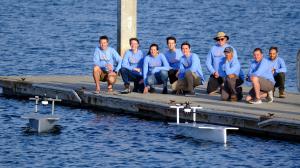Seasats Closes Pre-Seed Investment Round
“Seasats has assembled a tight-knit and exceptionally talented team with a wide range of experience across maritime industries and tech,” says Maxwell Brown, a member of Seasats’ advisory board. “Their creative, resourceful, and different approach to autonomous surface vehicles and operations stood out amongst their competitors.”
Seasats’ flagship vehicle, the X3, is a 3-meter autonomous surface vehicle (ASV) designed to offer a unique combination of reliability, versatility, and price. In Q1 and Q2 of 2022, the company’s focus is on completing survey missions that provide a cost-effective alternative to crewed missions costing tens or hundreds of thousands of dollars per day. At the same time, Seasats is preparing for the Trident Spectre event in July, one of the Navy’s foremost technology proving events. Seasats was one of 75 companies selected from a pool of over 350 candidates. Previously, the company has demonstrated alongside the Navy's M80 Stiletto, with the Naval Postgraduate School at their JIFX event, and most recently at US Special Operations Command's TE-22 event in Coronado. Besides this work, Seasats is continually integrating new sensors and capabilities to make ocean data more accessible for scientists and commercial operators.
The company’s roots go back to 2012, when several friends built a solar-powered uncrewed surface vehicle as a garage project. After dispersing to work on America’s Cup racing yachts, Ocean Aero uncrewed vehicles, and Tesla manufacturing, they regrouped in 2020 to create Seasats. The company has since added talent from Blue Origin and other innovative organizations to round out a team with formidable capabilities across autonomy, hardware, and electronics.
That team was one of the factors that attracted investor Ryan Coughlin. “We love finding engineers who understand and build for their market,” he says. “The Seasats platform is lightweight, modular, and simple, which should allow us to land large scale contracts where the boats are deployed in volume, as well as serve new applications and other growing commercial markets for marine autonomy that others can’t.”
The need for scalable marine autonomy spans industries. Chief of Naval Research Lorin C. Selby has remarked on the need for “the small, the agile, and the many,” and the Navy has established Task Force 59 and ongoing events focused specifically on marine autonomy. In the commercial sphere, companies including IBM, Fugro, and Teledyne have begun trialing uncrewed platforms in applications ranging from offshore wind surveys to water quality monitoring. NOAA selected uncrewed systems as the first of their science and technology focus areas, and counterparts such as the UK’s National Oceanography Centre are already leveraging uncrewed vehicles in cutting-edge research. Seasats’ combination of price and dependability positions them well for a future where fleets of autonomous vehicles roam the oceans.
“We have a lot of people to thank at this point,” says CEO Mike Flanigan. “Our investors have tremendous cross disciplinary expertise, Jonathan Fentzke and the Techstars family were instrumental in helping level up Seasats, and our advisory board has provided invaluable guidance and support. We’re very grateful to them and to all our other supporters.”
“We’re thrilled to have reached this milestone,” he adds, “but it’s just the first step. There’s so much room for modernization in ocean industries. The next few years will be really exciting.”
About Seasats:
Seasats creates and operates autonomous surface vehicles (ASVs) that make critical ocean data accessible for scientists, energy companies, and defense operators. The company’s solar-powered ASVs can stay at sea for months and carry wide varieties of payloads, combining the endurance of a buoy with the versatility and mobility of a crewed vessel. With an exceptional team, backing from major industry players, and uniquely affordable service and turnkey options, Seasats is bringing 21st century tech to stagnant maritime industries.
Declan Kerwin
Seasats
info@seasats.com
Visit us on social media:
Facebook
Twitter
LinkedIn
Legal Disclaimer:
EIN Presswire provides this news content "as is" without warranty of any kind. We do not accept any responsibility or liability for the accuracy, content, images, videos, licenses, completeness, legality, or reliability of the information contained in this article. If you have any complaints or copyright issues related to this article, kindly contact the author above.

